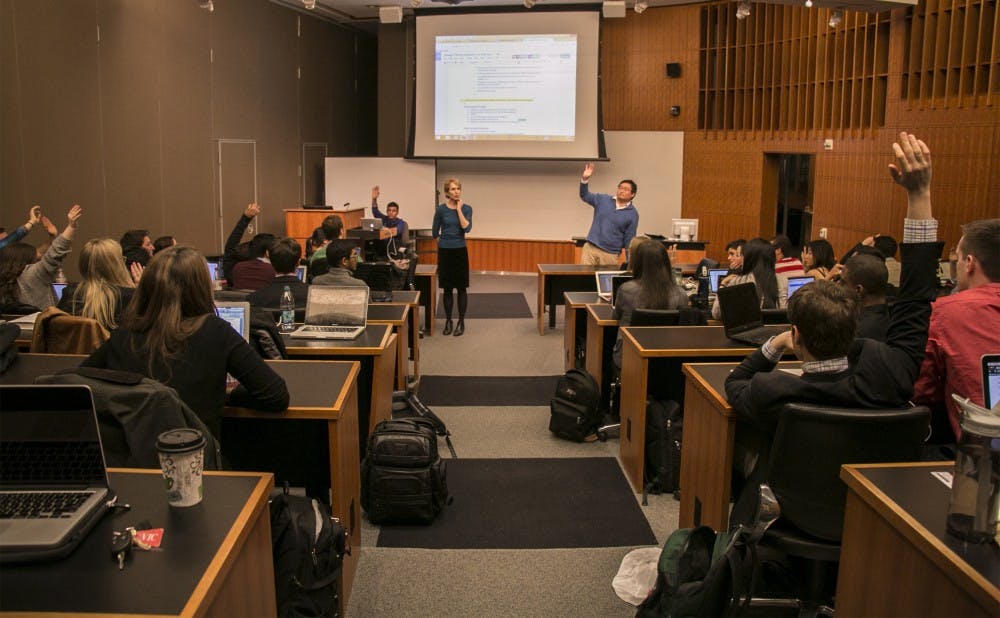- A resolution was passed to recommend funding for an emergency room co-payment for victims of sexual assault.
- Susan Lozier led a town hall meeting on the University's strategic plan.
- A petition against upperclassmen residence quotas in selective living groups has reached approximately 800 signatures.
Duke Student Government recommended that the University subsidize emergency room fees for victims of sexual assault.
The resolution—which was passed during DSG's Wednesday meeting—recommends that the University fund a $150 emergency room co-payment for victims of sexual assault, which would come from a $12,000 yearly fund sized to accommodate all victims. The emergency room visit would allow the victim to see a sexual assault nurse examiner, who can collect forensic evidence, which other organizations on campus, such as Student Health, cannot do, junior Keizra Mecklai, vice president for equity and outreach, explained.
“The highest standard of care after a woman or a man has been sexually assaulted can be received by receiving a SANE examination at the Duke emergency room,” Mecklai said. “If you go to Student Health, your ability to get forensic evidence taken has been voided.”
The resolution—which was passed in conjunction with the Graduate and Professional Student Council—also ensures that Student Health, the Women’s Center or Counseling and Psychological Services will explicitly inform sexual assault victims of their right to receive emergency room care and to have the co-payment for that care covered by the University, regardless of whether or not a student wants to report a crime.
The resolution was introduced by Mecklai and Executive Vice President Abhi Sanka, a junior, as well as GPSC Director of University Affairs Colleen McClean, a third year MD/PhD student.
Mecklai, Sanka and McClean also explained in their presentation that this type of fund is already in place at several of Duke’s peer universities, including the University of North Carolina at Chapel Hill.
In addition to the passing of the resolution, DSG discussed the University's strategic plan in a town hall meeting led by Susan Lozier, the chair of the University Strategic Plan steering committee and Ronie-Richelle Garcia-Johnson, professor of ocean sciences.
The town hall—which was organized by senior Ray Li, vice president for academic affairs—focused on the student experience at Duke, the University's strengths and weaknesses and where students want to see Duke in ten years.
Senators emphasized Duke’s strengths, including the prevalence of undergraduate University Strategic Plan steering committee research, the strength of Duke’s interdisciplinary education and small class sizes. DSG members also expressed desires to reduce the exclusivity of certain programs like DukeEngage and Bass Connections, to lower the number of sexual assaults and to create an undergraduate business school.
Lozier said that she hoped the feedback would give her an initial idea of student desires concerning the University’s direction and possible changes to the strategic plan. The new strategic plan, which will be developed under the supervision of Provost Sally Kornbluth, will be created over the next 18 months and will incorporate feedback from students, faculty, staff and alumni in order to guide the direction of the University.
In other business:
Nine new at-large senators were sworn in by Chief Justice Will Giles, a senior.
The DSG executive board reiterated support for the petition against enforcement of upperclassmen residence quotas for selective living groups and greek organizations. The petition now has around 800 signatures, said president Lavanya Sunder, a junior.
The Student Organization and Funding Committee approved the funding of three groups: DukeAfrica received $4,000 to cover theater and logistical costs for their annual cultural showcase, Jabulani; the Asian Students Association received $9,000 for their Lunar New Year production; and the Duke Relay for Life received $3,900 to cover their fundraiser.
The Senate approved a statute to create a DSG Software Task Force which will be composed of four to eight people who will maintain the upkeep of DSG technology projects.
Get The Chronicle straight to your inbox
Signup for our weekly newsletter. Cancel at any time.

